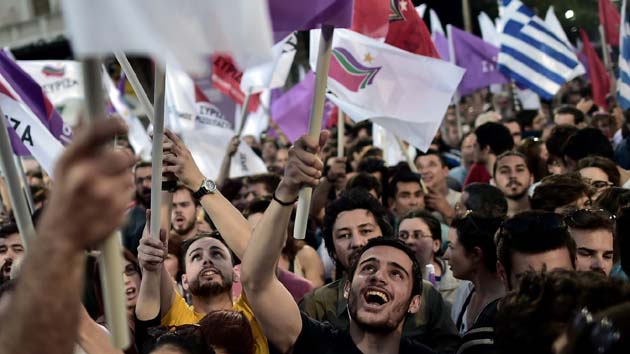James Supple looks at how negotiations with the EU have seen Syriza agree to accept a new version of austerity—undermining initial promises
Greece’s new left government, Syriza, came to power in a major rejection of the austerity agenda, after five years of immense suffering for the Greek people since the global economic crisis began.
But the deal struck by Syriza in February for a four-month extension on the country’s loans is a defeat for its strategy of negotiating an end to these policies within the European Union (EU).
The EU has set out to inflict a humiliate Syriza. They, and in particular their leading economic power Germany, want to force working class people in Greece and across the Eurozone to bear the burden of restoring profits and economic growth through cuts to wages and public services.
They are trying to use Greece’s debts to the EU and IMF of around $340 billion to force it to accept a continuation of the privatisation, public sector job cuts and cuts to government spending that have been the price of the country’s bailout loans since 2010.
At stake is not just the continuation of austerity in Greece, but across the whole of Europe.
If Greece can defeat austerity it will boost the confidence of workers, the left and new anti-austerity parties like Podemos in Spain who are all fighting the same policies in the context of ongoing economic crisis and mass unemployment.
Syriza was elected on a promise to end austerity and expel the Troika (the EU, the IMF and the European Central Bank) which imposed the ruthless austerity measures.
But it has now agreed to extend the loan on the basis that the Troika, now re-named “the institutions”, retains a veto over any efforts to end existing austerity measures.
The list of initial reforms Syriza submitted to the EU as part of the deal agrees to proceed with privatisation and promises to cut costs in government spending.
Syriza won, at most, modest compromises, such as a reduction in the budget surplus the government is required to run. It hopes to reduce this 1.5 per cent of GDP. But even this would still impose crippling restraint on the government’s ability to fund jobs and services.
The February deal with the EU has caused significant anger inside the party. Economist and Syriza central committee member Stathis Kouvelakis called it a “thorough failure”, saying it “represents the defeat of … the government’s current approach”.
Ninety-two year old Syriza MEP Manolis Glezos, a wartime resistance fighter against the Nazis, called for urgent opposition to the deal inside the party.
A motion from the Left Platform group rejecting the agreement received the backing of 41 per cent of Syriza’s central committee.
The Greek government was under severe pressure, with billions in loan repayments due at the end of February, and a run on the Greek banks as the negotiations began to falter. Some say they struck the best deal possible in the circumstances.
But the retreat from their previous promises shows the impossibility of negotiating an end to austerity and Greece’s debt burden within the EU.
Exiting the Eurozone
Syriza refuses to contemplate any exit from the EU, a view opinion polls show is shared by the bulk of the population.
Yet there is a glaring contraction between the promise to end austerity and staying in the EU, a fact Syriza leader Alex Tsipras and Finance Minister Varoufakis have carefully avoided.
Syriza’s position gives Germany and the EU a stranglehold over Greece. Its banks in particular rely on continued bailout funding from the EU to prevent their collapse.
Greece’s battle with the EU has just begun. By the end of June a new more comprehensive bailout deal has to be agreed.
But there is an alternative to these negotiations. The working class should refuse to pay the costs of the crisis through the continuation of austerity. Leaving the EU would allow Greece to default on its debts and remove the need to continue the crippling repayments.
This would require nationalising the banks to prevent their collapse and imposing currency controls to stop the rich taking their money out of the country.
Greece would have to go back to using its own currency instead of the Euro. This would mean severe economic dislocation, with a spike in inflation reducing the purchasing power of Greek workers’ wages.
But this could be addressed through expanding social welfare programs and workers demanding pay rises to compensate for increased living costs.
All this could be paid for by seizing the wealth controlled by big business and the rich inside Greece. There are people in Greece who remain immensely wealthy despite the economic crisis.
Greece has the largest merchant shipping fleet in the world, but its shipping companies pay almost nothing in tax.
Struggle the key
For now Syriza’s popularity has increased. This is because it is the first Greek government that has attempted to stand up to the EU since the bailout negotiations began in 2010. But the Syriza government is trapped. If it continues to deal with the EU it too will now be responsible for implementing austerity.
The consequence of the deal is that many of its key promises are on hold. The increase in the minimum wage, already postponed for a year, will now be subject to consultation with “the institutions”. The plan to rehire 20,000 sacked public servants will go ahead, but at the expense of any new recruitment.
One example of the problems is the situation in hospitals. Health workers from a number of hospitals in Athens went on strike on 11 March. Costas Kadarachias, a union secretary at the Aghios Savvas cancer hospital explained, “Most of the workers here voted for Syriza to stop the austerity that has been imposed on Greece.
“But we know we can’t wait for the government. Our problems are getting worse every day—hospitals are understaffed, underfunded, with many facilities closed.” Hundreds of positions at the hospital remain vacant.
It is working class struggles like these outside parliament, not the actions of a Syriza government, that will ultimately determine whether there is an end to austerity.
Even if Syriza adopted the drastic measures needed to make big business and the rich pay for reversing austerity they would face enormous resistance from the European ruling class.
The wealthy would attempt to wage economic sabotage against the government and to mobilise the hard core of the state, in particular the police and the military, to fight such a challenge to their wealth.
This was the experience of Chile in 1973, where the democratically elected Allende government was overthrown in a coup, and also of Hugo Chavez in Venezuela who faced a series of attempted coups after his efforts to redistribute wealth.
This makes the decision to give the right-wing nationalist party Independent Greeks (ANEL) the post of Defence Minister, in charge of the army, particularly dangerous. An MP from another party has also been appointed Minister for Public Order, in charge of the police.
The only way to resist such an onslaught would be for the working class to take control of their workplaces out of the hands of the bosses and to start to run the economy themselves.
There have been small examples of this in Greece already, like the occupation of the national broadcaster ERT when the government tried to shut it down in 2013.
Workers took over and began running TV and radio services themselves, setting an example and showing how workers’ control over production could work.
Deepening and spreading struggles like these is the key to building an alternative to austerity and capitalism from below.
Ultimately, these struggles would have to end in a revolution where the working class forms its own government based on workers’ power in the factories and destroys the old capitalist state.
Left government
Governments that take power through parliamentary elections do not control the main sources of power in capitalist societies—the wealth and profits controlled by big business and the repressive functions of the state, like the police, the army and the courts.
This means that left governments face the danger of being pulled into compromises with big business and the state, which means acting to demobilise the kind of struggles outside parliament necessary to bring real change.
There are already signs that Syriza’s leadership is locked into such a trajectory.
On the eve of its election leader Alex Tsipras made continual efforts to reassure big business in Greece and the international markets that the party would not be as radical as they feared and was committed to the EU. The major capitalists in Greece still want the country to remain inside the EU, seeing this as key to securing their own profits within Europe.
More recently Tsipras has tried to present the deal Syriza struck with the EU as a victory, saying, “We showed that Europe can be an arena of negotiation and mutually acceptable compromise”.
Yanis Varoufakis, the Finance Minister, went even further boasting, “We have great success. We were alone but became the majority”. These arguments send the message that workers in Greece have to accept some version of austerity, and undermine the resistance from below.
But it’s the resistance and class struggle from below that holds the key to reversing austerity and building a society based on human need, not the profits of the bankers.






